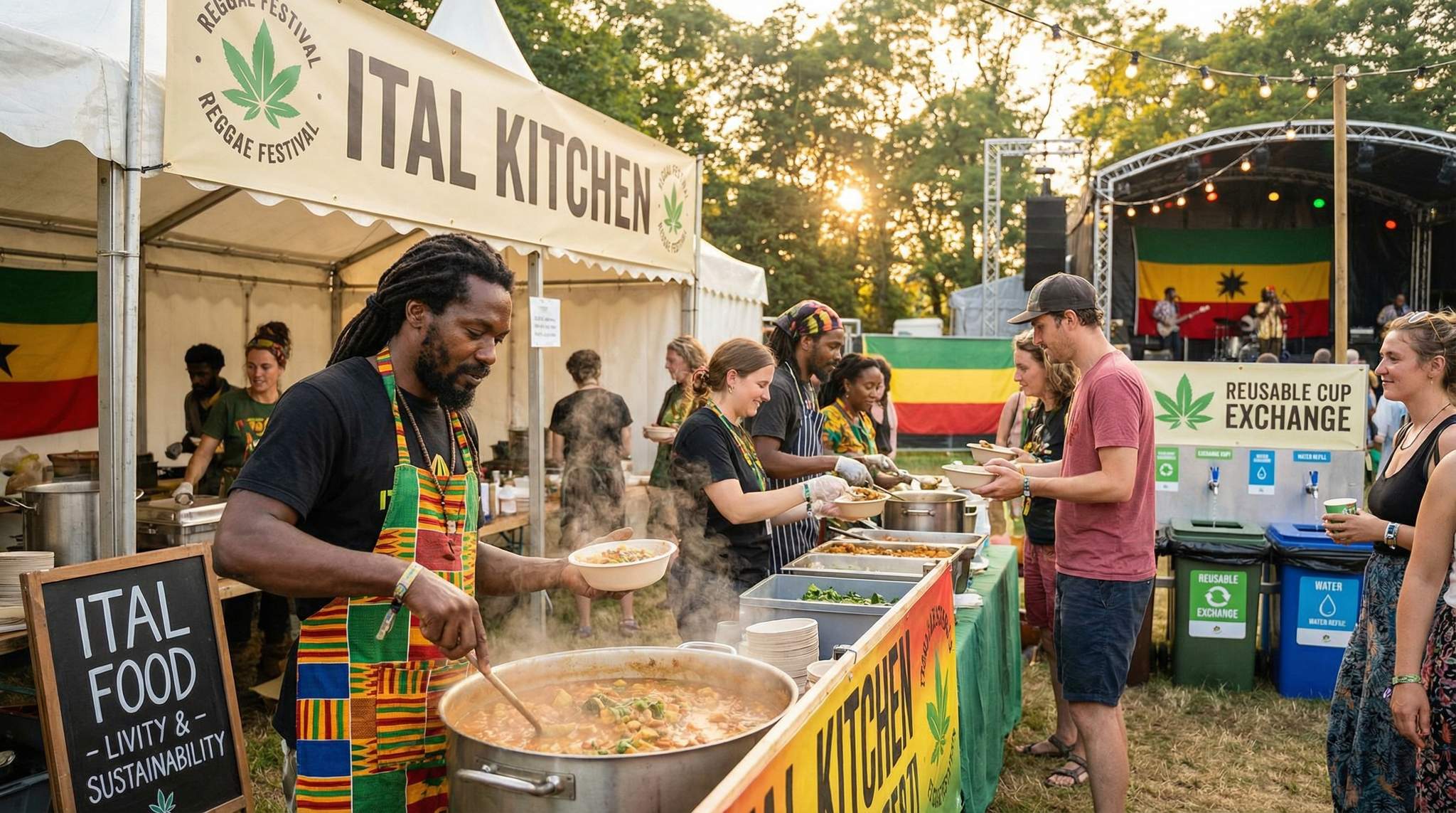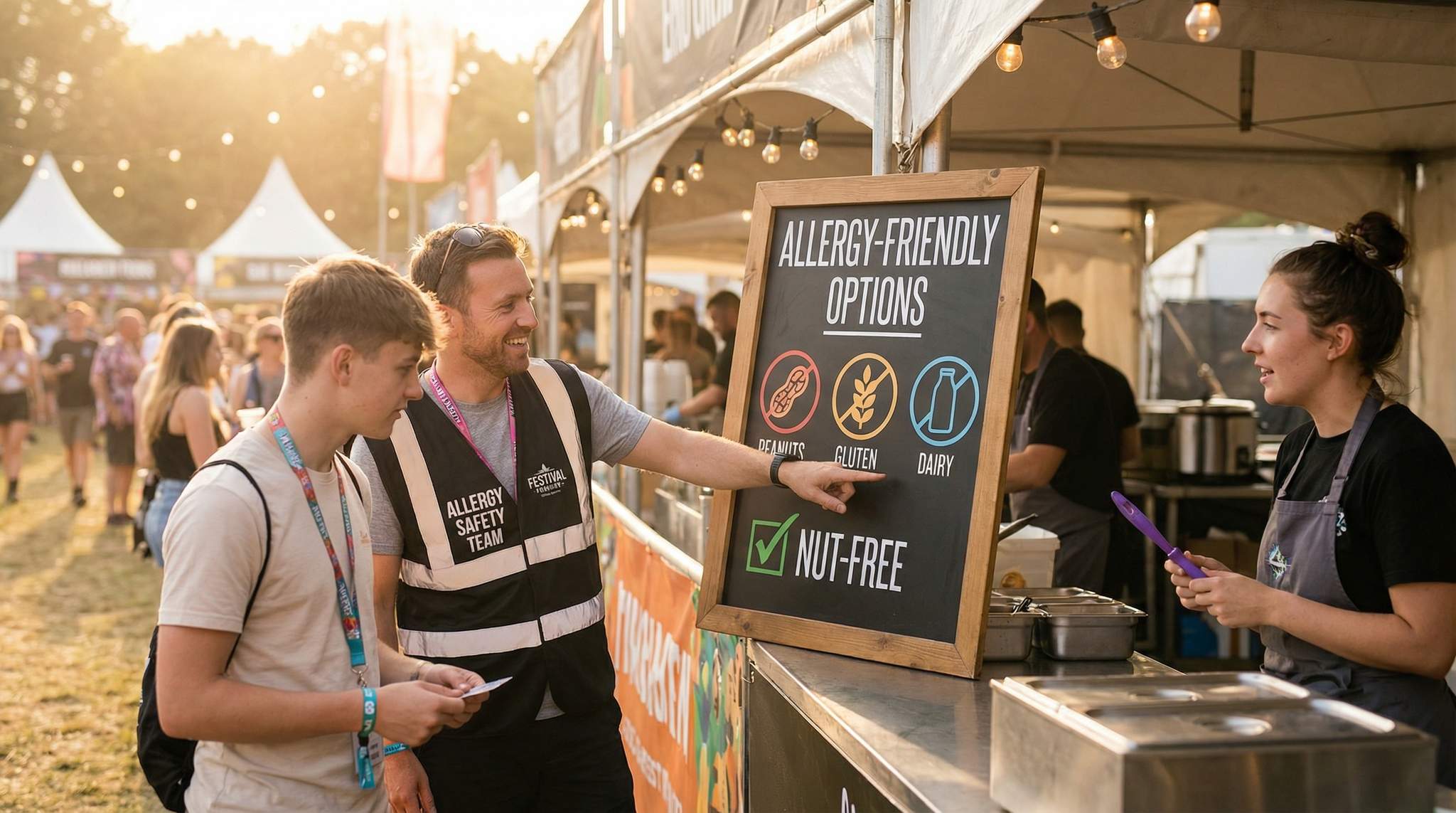Reggae festivals around the world are embracing “livity” – a Rastafari concept of living in harmony and balance – to drive sustainability efforts. For festival organisers, this means aligning eco-friendly practices with the genre’s values of care, community, and respect for nature. By weaving green initiatives into the fabric of a reggae event, festival teams not only reduce environmental impact but also enhance the event’s authentic spirit. From cutting waste and quieting generators to serving ital (natural, plant-based) meals, sustainable choices can resonate deeply with reggae fans and artists alike.
Reusables and Refill Stations: Reducing Waste in the Spirit of Livity
One of the simplest, most visible green practices is to cut down on single-use plastics. Disposable cups, bottles, and utensils create enormous waste that clashes with reggae’s ethos of respecting the Earth. By switching to reusables and offering refill stations, festivals demonstrate the value of care for the environment in a very practical way. Many reggae events have proven this can work: for example, Rototom Sunsplash in Spain completely eliminated single-use plastic bottles and cups by introducing reusable cups and free water refill points throughout the venue. In California, the Cali Roots festival sold custom reusable water bottles, which helped eliminate an estimated 417,000 single-use plastic bottles per year – a change that both fans and the planet appreciate.
-
Reusable cup schemes – Launch a deposit system for cups. For example, Reggae Geel (Belgium) provides each attendee with an “eco-coin” token that can be exchanged for a sturdy reusable cup. Fans return their cup for a refill or new token with each drink, reducing litter dramatically. Invest in quality cups and reuse them across years: at Rototom Sunsplash, sustainability manager Fiachra Mc Donagh has noted that they sanitise and reuse the same cups every festival, rather than printing new ones each time, which cuts waste to zero.
-
Hydration stations – Make water refills easy. Eliminate sales of single-use water bottles and install plenty of free water refill stations around the venue (aim for short wait times even during peak hours). Encourage fans to bring their own empty bottles or offer branded reusable bottles as merchandise. This not only prevents plastic waste but also keeps attendees hydrated and happy.
-
Sustainable serveware – Work with food vendors to replace disposable plastic plates and cutlery with compostable or reusable alternatives. Some festivals supply vendors with approved biodegradable items (made of materials like bagasse or bamboo) and set up on-site or off-site composting to ensure these don’t end up in landfill. Others, especially at smaller gatherings, use washable dishware collected and cleaned by volunteers or a contractor. Select the approach that fits your event’s scale and infrastructure.
Plant-Forward Menus and Ital Cuisine: Nourishing People and Planet
Food choices at a festival can send a powerful message. Emphasising plant-forward menus – offering abundant vegetarian and vegan dishes – aligns with reggae’s value of livity, which prizes a natural, balanced lifestyle. Ital cuisine (derived from “vital”) in Rastafarian culture means pure, plant-based foods that increase life energy. Offering ital food options not only reduces a festival’s environmental footprint (plant-based meals generally produce far less carbon emissions and waste than meat-heavy ones) but also celebrates reggae’s cultural roots. Many reggae festivals naturally incorporate ital principles. Jamaica’s Rebel Salute, for instance, was founded by artist Tony Rebel on a commitment that no meat or alcohol be sold on site – a rule kept alive since 1993. This bold stance has become a hallmark of the event’s identity, proving that conscious choices can attract a loyal audience and positive reputation.
Planning a Festival?
Ticket Fairy's festival ticketing platform handles multi-day passes, RFID wristbands, and complex festival operations.
-
Abundant vegetarian options – Require or encourage every food vendor to offer vegetarian or vegan dishes. The wider the variety of tasty plant-based meals, the easier it is for attendees to choose them. Consider featuring Afro-Caribbean ital specialties (like veggie stews, curries, and fresh juices) to celebrate reggae culture. Some festivals even dedicate a section of the food court to all-vegetarian vendors or host an “Ital Kitchen” demonstration area to showcase plant-based cooking.
-
Local and organic sourcing – Work with caterers who use locally grown, organic ingredients. This reduces the carbon footprint from food transport and supports regional farmers (often the same communities that support your festival). Partnering with local farms for fresh produce – or even holding a farmers’ market stall on site – can connect festival-goers with the land and community, strengthening the spirit of one love beyond the stage.
-
Food waste reduction – Plan to handle surplus food sustainably. Encourage vendors to donate unserved meals to local shelters or food banks at the end of each night. Set up clearly marked bins for organic scraps and arrange composting for collected food waste. For example, the California Roots festival composted over 6,000 lbs (about 2.7 tonnes) of food waste in one edition instead of sending it to landfill. By tracking and publishing how much food is composted or donated, you inspire both crew and fans to waste less.
Transparency in Action: Honest Waste and Energy Stats Nightly
True sustainability is about accountability. One way to stay accountable is by openly sharing how the festival is doing on key environmental metrics – in as close to real time as possible. Publishing nightly waste and energy statistics (for example, posting how many kilograms of recycling versus landfill were collected each day, or how much fuel was consumed by generators) shows that the organisers are serious about their goals. This level of transparency reflects respect for the community: it says, “we’re all in this together to reduce our impact.” Fans tend to respond positively when they see genuine data – even if the numbers aren’t perfect yet. Honest reporting can rally attendees and staff to pitch in more: if you announce that “only 60% of waste was recycled today,” the crowd knows they can help do better tomorrow.
Several festivals have adopted this approach. At Ireland’s Body & Soul, the team tracked and publicised their waste reduction – from 81 tonnes of waste in 2019 down to 28 tonnes in 2022 after introducing greener practices. The festival shared these outcomes with attendees and media, demonstrating progress and building trust. Similarly, the Spraoi arts festival in Waterford worked with the city to power stages via the mains grid; in 2022 they ran the entire event with no diesel generators at all, dramatically cutting noise and pollution in town.
To implement nightly reporting at your event, set up a system to weigh or estimate waste streams and log energy use each day. Then share the stats prominently – via social media, push notifications on your festival app, or physical notice boards on site. Celebrate the positives (“our solar lights saved X kWh today”) and be frank about areas to improve. Over time, this transparency can become a point of pride that engages the whole community in hitting sustainability targets.
Need Festival Funding?
Get the capital you need to book headliners, secure venues, and scale your festival production.
Quiet Power: Reducing Noise and Emissions for Better Mixes and Neighbour Relations
Electricity is the lifeblood of modern festivals – but it doesn’t have to roar. Quiet power means using energy sources and technologies that minimise noise and pollution. For reggae events, a calmer power supply can vastly improve the experience: the music sounds cleaner (no generator hum creeping into the mix) and nearby communities aren’t kept awake by engine noise. In densely populated areas or pristine natural settings, loud generators can be a major headache. Choosing quieter alternatives demonstrates respect for both the audience’s ears and the festival’s neighbours.
So what are the options? First, when possible use mains electricity instead of portable generators – many urban venues or fairgrounds have grid hookups that are far quieter and cleaner. If the site has limited grid capacity, mobile battery units can bridge the gap. For example, a theatre festival in the Netherlands supplemented a small grid connection with battery power to avoid bringing in a generator, saving about 20,000 litres of diesel and 61 tonnes of CO2 in one edition. That’s a huge environmental win, and those batteries ran silently through the night.
For off-grid reggae festivals, consider hybrid power systems: a combination of solar panels, batteries, and efficient generators used only when needed. These setups keep stages powered with much less noise. Some organisers also impose quiet hours – switching to lower-volume acoustic sets or silent disco after midnight in respect of nearby residents. Fans can dance with headphones to the basslines all night while the countryside (and your neighbours) stay quiet. Even simple steps like placing generators in sound-insulated enclosures or at a distance from stages and campsites can make a big difference. The bottom line: investing in quiet power technology and thoughtful scheduling not only cuts emissions, it creates a more enjoyable atmosphere for everyone.
Fan Engagement: Rewarding Green Actions
Sustainability at festivals isn’t just about what organisers do – it’s also about inspiring the fans to get involved. Reggae festivals flourish on community spirit, so tapping into that can multiply the impact of your green initiatives. A great way is to reward attendees for eco-friendly actions. People are more likely to participate if it’s fun and they feel recognised (and it doesn’t hurt if they get a perk for their effort!).
-
Recycling and cleanup incentives – Make waste reduction a game. Offer “trash for swag” programs: for example, Reggae Geel rewards campers who separate and turn in their rubbish with special festival memorabilia. Some events charge a small eco-deposit on tickets or camping passes and refund it when the attendee hands back a full bag of recyclables or trash. This motivates nearly everyone to leave the grounds cleaner – nobody wants to forfeit their deposit or miss out on cool freebies!
-
Green travel perks – Encourage fans to carpool or use public transport by sweetening the deal. You could provide priority parking or discounted parking fees for cars that arrive full of passengers. Or partner with transit authorities to include free shuttle buses for ticket-holders. Get creative: announce a contest for the group that traveled the most eco-friendly way (bicycles, electric vehicles, etc.), with the winners getting backstage passes or merch. When attendees see their peers being celebrated for reducing carbon emissions, it inspires more of them to do the same next year.
-
Digital engagement and rewards – Leverage your festival’s app or ticketing platform to drive green action. A fully digital ticket (such as those provided by Ticket Fairy) not only cuts paper waste, but also allows direct communication with fans. Send push notifications during the event with sustainability challenges (“Take a photo at the recycling station for a chance to win a meet-and-greet”). Use QR codes or in-app check-ins for activities like refilling water or attending a climate workshop, and let attendees accumulate points for prizes. This kind of eco gamification taps into fans’ competitive side and spreads eco-awareness in a fun way.
Stewardship Aligns with Reggae’s Heart
At its core, reggae music has always been about consciousness, unity, and respect – for one another and for the world we share. By championing sustainability, festival organisers are putting these values into practice on a grand scale. Fans notice when a festival cares: it transforms a music event into a movement, where everyone feels like part of something positive beyond just the concerts. Efforts like going green with power, reducing waste, and nurturing the community echo the messages in reggae anthems of oneness and love.
Every success and setback on this sustainability journey offers a lesson. Don’t be afraid to start small and improve year by year – perhaps one year you introduce reusables, next year you tackle energy usage, and so on. Share your wins with pride and your challenges with honesty. The next generation of festival producers will be standing on your shoulders, so documenting what you’ve learned is itself an act of stewardship. In the end, aligning your festival’s operations with the heart of reggae – caring, balanced, and community-minded – will ensure the vibes stay positive and irie for many years to come.
Frequently Asked Questions
What does livity mean in the context of reggae festivals?
Livity is a Rastafari concept of living in harmony and balance with nature, which drives sustainability efforts in reggae festivals. Organizers apply this by aligning eco-friendly practices, such as waste reduction and plant-based dining, with the genre’s core values of care, community, and respect for the Earth.
How can reggae festivals reduce single-use plastic waste?
Festivals reduce single-use plastic by implementing reusable cup deposit schemes and installing free water hydration stations throughout the venue. Events like Rototom Sunsplash have successfully eliminated plastic bottles entirely by offering refill points, while others sell branded reusable bottles to prevent thousands of disposables from entering landfills.
Why is ital food important for sustainable reggae events?
Ital food refers to pure, plant-based cuisine derived from Rastafarian culture intended to increase life energy. Serving ital options significantly reduces a festival’s carbon footprint compared to meat-heavy menus while honoring reggae roots. Events like Rebel Salute maintain strict no-meat policies to uphold these cultural and environmental values.
What are quiet power solutions for outdoor music festivals?
Quiet power solutions involve using mains electricity grids, mobile battery units, or hybrid solar systems instead of loud diesel generators. These technologies minimize noise pollution, allowing for cleaner sound mixes and better relationships with neighbors, while significantly cutting carbon emissions and fuel consumption.
How can festival organizers encourage fans to recycle?
Organizers encourage recycling by gamifying waste collection through “trash for swag” programs or eco-coin deposit systems. Offering rewards like festival merchandise, priority parking, or ticket refunds for returning full bags of recyclables motivates attendees to keep the venue clean and actively participate in sustainability efforts.
Why should festivals publish nightly waste and energy statistics?
Publishing nightly statistics on waste and energy usage builds accountability and trust with the audience. Sharing real-time data, such as recycling rates or fuel saved, demonstrates a genuine commitment to sustainability and rallies both staff and attendees to improve their environmental impact during the event.
How do reusable cup deposit schemes work at festivals?
Reusable cup schemes operate by charging attendees a deposit or token for a sturdy cup upon their first drink order. Fans exchange the used cup for a fresh one or a token with subsequent rounds, and organizers sanitize and reuse the inventory across multiple years to cut waste to zero.
What are sustainable ways to manage festival food waste?
Sustainable food waste management involves donating unserved meals to local shelters and composting organic scraps. Festivals can require vendors to use compostable serveware and set up specific organic waste bins, diverting tons of material from landfills and converting it into useful soil resources.





